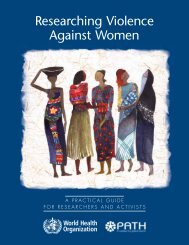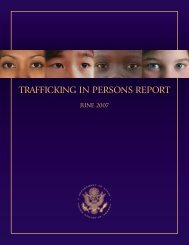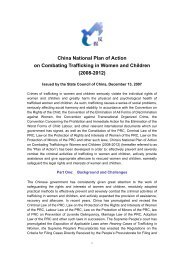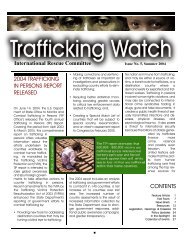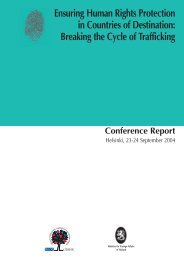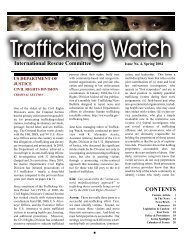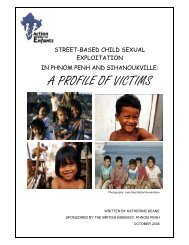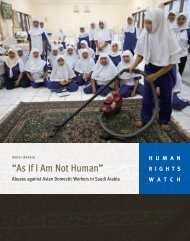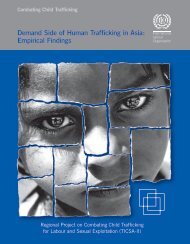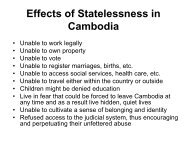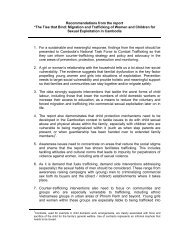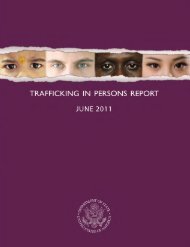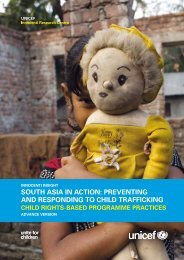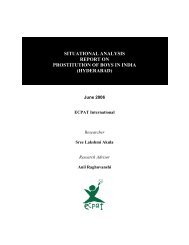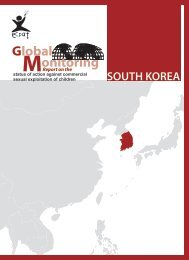Download PDF - Violence Against Children - East Asia and the ...
Download PDF - Violence Against Children - East Asia and the ...
Download PDF - Violence Against Children - East Asia and the ...
Create successful ePaper yourself
Turn your PDF publications into a flip-book with our unique Google optimized e-Paper software.
executive summary<br />
The Philippines<br />
In <strong>the</strong> Philippines, a significant advantage is<br />
that national child protection legislation<br />
exists. Greater opportunity exists for<br />
concerned groups to access information from<br />
<strong>and</strong> to lobby government. Implementing<br />
national policy at <strong>the</strong> local government level,<br />
however, requires <strong>the</strong> involvement of NGOs<br />
<strong>and</strong> civil society to identify practical child<br />
protection measures, maximise opportunities<br />
<strong>and</strong> counter constraints.<br />
Findings included:<br />
• Partnership, community organising <strong>and</strong> a<br />
broad range of involvements assist in<br />
gaining local ownership, securing a legal<br />
base for a local government code <strong>and</strong><br />
creating expectation/commitment for<br />
implementation.<br />
“Start with <strong>the</strong> window of <strong>the</strong> community, <strong>and</strong><br />
<strong>the</strong>n you need to make a door”<br />
– comment from NGO discussion<br />
in <strong>the</strong> Philippines<br />
• Civil society gains strength through<br />
functioning networks, which allow for local<br />
issues of child protection to be addressed<br />
in ways that would not be possible for a<br />
single agency to achieve.<br />
• Where children <strong>and</strong> communities have a<br />
vibrant faith-based commitment, this is a<br />
source of hope <strong>and</strong> energy for change.<br />
• The development of local legislation<br />
supported by local taxes promotes local<br />
accountability for child protection.<br />
• Documentation of <strong>the</strong> process of<br />
development of a children’s code has<br />
allowed for this approach to be adapted to<br />
o<strong>the</strong>r provinces <strong>and</strong> similar codes formed.<br />
Sri Lanka<br />
In Sri Lanka, decades of conflict have affected<br />
children, compromised <strong>the</strong>ir development<br />
<strong>and</strong> in some cases, seen children <strong>the</strong>mselves<br />
actively participate in <strong>the</strong> fighting. Sri Lankan<br />
children have experienced reduced access to<br />
education <strong>and</strong> development, <strong>and</strong> have<br />
identified domestic violence <strong>and</strong> loss of<br />
livelihood as o<strong>the</strong>r threats to <strong>the</strong>ir<br />
development <strong>and</strong> protection.<br />
The findings of this chapter include:<br />
• The Sri Lankan <strong>Children</strong>’s Challenge, an<br />
event linked to <strong>the</strong> 2002 United Nations<br />
General Assembly Special Session on<br />
<strong>Children</strong>, gave more than 11,000 children<br />
<strong>the</strong> opportunity to identify barriers <strong>the</strong>y<br />
face <strong>and</strong> to recommend solutions to <strong>the</strong>ir<br />
Government. This successful campaign is<br />
one example of advocacy supported by<br />
inter-agency cooperation.<br />
• <strong>Children</strong> have capacity <strong>and</strong> potential to<br />
advocate locally, even when o<strong>the</strong>rs fear to<br />
raise <strong>the</strong>ir voice; this is illustrated by <strong>the</strong><br />
success of a children-led movement to<br />
oppose illegal alcohol brewing which<br />
contributes to high rates of domestic<br />
violence.<br />
• Community structures <strong>and</strong> approaches can<br />
be developed that promote child<br />
protection on a local <strong>and</strong> national level.<br />
• Relief efforts, in areas of <strong>the</strong> country that<br />
are now becoming more accessible, need<br />
to include child protection as a key area of<br />
response along with issues of health <strong>and</strong><br />
education.<br />
Vietnam<br />
In Vietnam, <strong>the</strong> main focus of <strong>the</strong> study is<br />
children with disabilities. Awareness of<br />
disability <strong>and</strong> of child abuse or neglect is often<br />
extremely limited, <strong>and</strong> those in need of extra<br />
care are too often invisible to o<strong>the</strong>rs. The<br />
study examines community-based approaches<br />
that engage with local communities <strong>and</strong><br />
structures in integrated care <strong>and</strong><br />
rehabilitation for <strong>the</strong>se children, seeking to<br />
broaden <strong>the</strong> definition of “community” to<br />
include vulnerable members who often are<br />
hidden away.<br />
8



